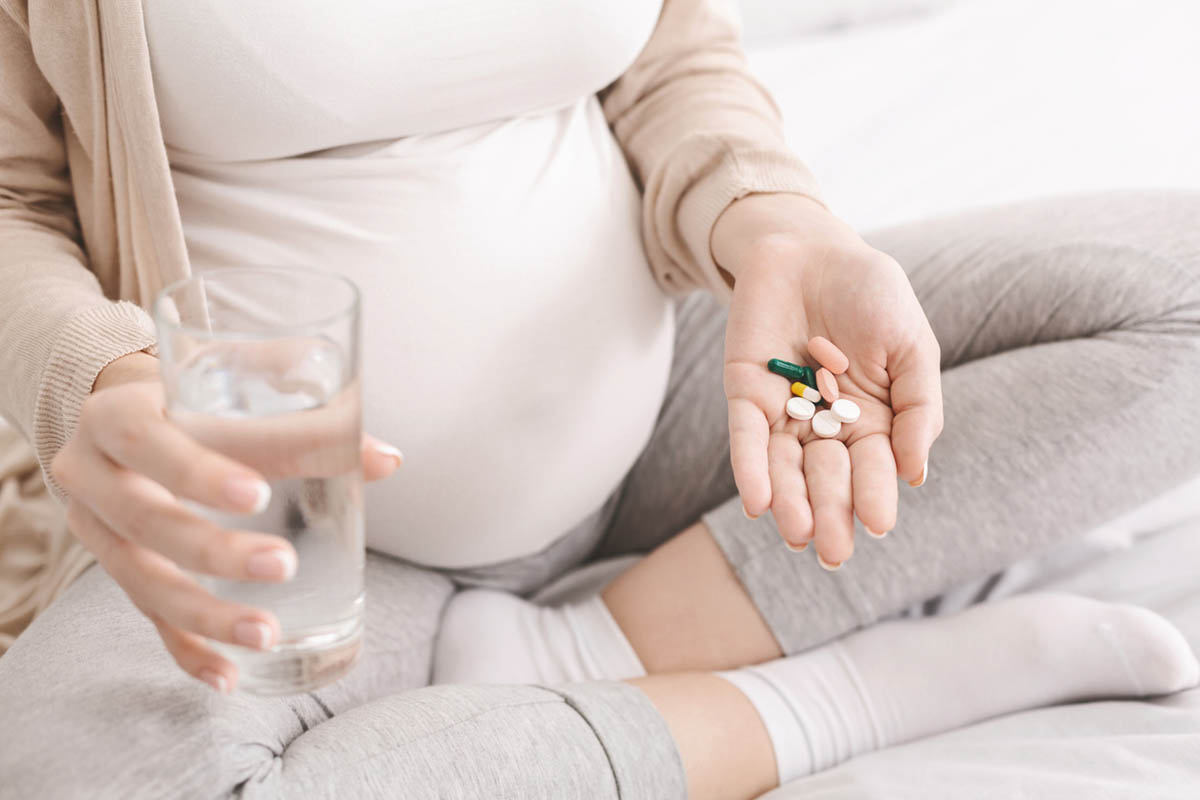See article by Mocking et al

Omega-3 Fatty Acid Supplementation for Perinatal Depression and Other Subpopulations?
While standard antidepressant medications are considered first-line treatments for moderate to severe major depressive disorder (MDD) in pregnant and postpartum women,1 many clinicians might be surprised to learn that there have been very few randomized, placebo-controlled trials of antidepressants in perinatal women, as either acute or prophylactic treatment.2-5 Concern about antidepressant exposure in utero and during breastfeeding has driven patients and clinicians to seek alternatives for treatment. While psychotherapies have received the most systematic study, omega-3 fatty acids (O3) have been rigorously studied in far more trials than antidepressants in either depression during pregnancy or postpartum depression. What is also notable about the study of O3 in perinatal depression is that in this population, O3 have usually been used as monotherapy, while in most studies of O3 for MDD in general, they have been studied adjunctively with standard antidepressants.
In the current issue of JCP, Mocking and colleagues6 present an analysis of O3 randomized controlled trials in the treatment of perinatal depression. The results, from a pooled sample of 18 studies involving 4,052 participants, revealed that O3 had only a mild effect in reducing depressive symptoms across the perinatal cycle (showing a modest effect size of 0.26, with the significance P value for omega-3 oils just sliding in at .042). Of note, the results also showed that in respect to subanalyses involving different perinatal periods (during pregnancy and postnatal) a stronger effect size was apparent postpartum, thus leading the authors to conclude that O3 was not an effective intervention during pregnancy. It should however be noted that while effect sizes were larger postpartum, both pooled analyses were statistically nonsignificant, and, further, one particular study included from Iran was an extreme outlier, with a very large effect size of 2.0, further skewing the results. Thereby, any recommendation cannot currently be extended for confident use in perinatal depression. Marked heterogeneity was also observed in the studies, thus further illustrating a lack of confidence in the data.
We would however note that it may be premature to conclude, as Mocking et al6 did, “We advise against prescribing omega-3 PUFAs for the treatment or prevention of depressive symptoms during pregnancy.” While we agree that the data do not currently support this approach uniformly, there still may be a utility for O3 prescription in cases of marked dietary deficiency or in cases of obesity or comorbid inflammatory conditions.7 For instance, as stated, it does stand to reason that there is theoretical benefit in the postpartum period due to an activation of the immune/inflammatory system and potential weight retention, both aspects that may benefit in particular from the O3 component eicosapentaenoic acid (EPA). Indeed, it is contended that prenatal depression may be significantly associated with lower O3 levels and higher levels of inflammatory cytokines.8,9
This consideration echoes our recent International Society for Nutritional Psychiatry Research (ISNPR) clinical guidelines for the use of O3 in depression.10,11 The guidelines covered 19 statements focusing on 5 major domains in MDD treatment. The panel involved 14 international experts who participated in the web-based Delphi process that validated the statements. A total of 16 statements reached consensus, with the statement “n-3 PUFAs are one of the potential adjunctive treatments for adult MDD” reaching the highest agreement via the panel. Regarding specific populations, it is noted that many items reached high consensus despite suboptimal supportive evidence.
In respect to specialized populations, the expert consensus panel supported the use of O3 in MDD treatment for pregnant women, children, and the elderly and for prevention in high-risk populations. The guidelines stated that personalizing the clinical application of O3 in MDD subgroups with a low O3 index or high levels of inflammatory markers may be regarded as areas that deserve a future research focus.
Also, it has been demonstrated that O3 supplementation modestly (but consistently) lengthens gestation,12 potentially decreasing obstetrical and neonatal morbidity in a population of women with psychiatric disorders who are already at increased risk of premature delivery and other obstetrical complications. With that in mind, there might be even more of an impetus to leverage the use of O3 as part of the antidepressant treatment regimen, even if they are deemed insufficient for many individual women as monotherapy.
Of further note, the ISNPR clinical guidelines10,11 also contended that “(1) clinicians and other practitioners are advised to conduct a clinical interview to validate clinical diagnoses, physical conditions, and measurement-based psychopathological assessments in the therapeutic settings when recommending O3 in depression treatment; (2) with respect to formulation and dosage, both pure EPA or an EPA/docosahexaenoic acid (DHA) combination of a ratio higher than 2 (EPA/DHA > 2) are considered effective, and the recommended dosages should be 1-2 g of net EPA daily, from either pure EPA or an EPA/DHA (> 2:1) formula; (3) the quality of n-3 PUFAs may affect therapeutic activity; and (4) potential adverse effects, such as gastrointestinal and dermatological conditions, should be monitored, as well as obtaining comprehensive metabolic panels.” Further to these guideline recommendations, with respect to the formulation and therapeutic application of O3, the 2018 Lipids in Parenteral Nutrition summit panel of experts13 also suggested that “lipid emulsions” containing O3 acids from fish oil confer important clinical benefits via suppression of inflammatory mediators and activation of pathways involved in the resolution of inflammation.
A salient point raised by Mocking and colleagues6 concerns that the ISNPR Treatment Guidelines did not provide a dosage guide (while the present JCP authors did rightfully recommend a higher EPA content approach to prescription outside the perinatal period). To clarify, a precise dose for use during the perinatal period was not provided in the ISNPR Guidelines in part due to the lack of safety data regarding higher doses of O3 (eg, > 1 g of EPA per day) in pregnancy. While it is highly unlikely to have major health concerns to the fetus, caution is always advised, and further research is needed to be able to safely recommend higher doses (which in some cases may theoretically be more effective in reducing depression). We do however recognize that a high EPA approach may still not be the answer. Assessing the studies included in the present meta-analysis, there appears not to be an obvious pattern relating to higher EPA studies. For example, Judge et al (2014)14 and Kaviani et al (2014)15 used DHA or a lower EPA formulation and yet showed a beneficial effect, while others such as Freeman et al (2008),16 Nishi et al (2018),17 and Opiyo et al (2018)18 used higher EPA formulations and all had nonsignificant results.
Further, the ISNPR guidelines panel did conclude that studies testing O3 to “prevent” perinatal depression have been consistently negative. Notably, these studies have assessed O3 as monotherapy, rather than adjunctive to standard antidepressants (and the data do primarily support adjunctive application19,20). Another important conclusion is that most studies had small sample sizes with non-generalizable samples, and, due to this, clinicians are advised to interpret the results carefully and cautiously when prescribing during the perinatal period.
As the ISNPR guidelines state, many women and their health care providers do commonly seek to minimize pharmacologic exposures (eg, antidepressants) during pregnancy and breastfeeding, due to the potential of adverse effects for the fetus and breastfeeding safety concerns. Treatment decisions must be appreciated in the context that antenatal and postpartum depression carry risks for the mother and baby, and undertreatment or lack of treatment poses substantial risk.
Safe therapeutic options during the perinatal period are therefore vital and of significant ongoing interest. For now, a balanced evidence-informed approach would be to advise women in the perinatal period to consume adequate dietary O3, while supplementation can occur in marked deficiency. An additional clinical consideration can also involve the potential use of O3 in comorbid obesity and inflammatory conditions, while in those who are vegetarian, algal-based preparations may also be an option. Finally, while most studies have not shown a substantial nonselective benefit of O3 for the acute or preventative treatment of perinatal MDD, we can still suggest that other potential benefits to pregnancy, such as lengthening of the gestational period, may make the risk/benefit profile of O3 still attractive in pregnancy. This application may apply more judiciously as a potential adjunct to standard medications and psychotherapy.
Published online: September 1, 2020.
Potential conflicts of interest: Dr Sarris has received presentation honoraria, travel support, clinical trial grants, book royalties, or independent consultancy payments from Integria Healthcare & MediHerb, Pfizer, Scius Health, Key Pharmaceuticals, Taki Mai, Fiji Kava, FIT-BioCeuticals, Blackmores, Soho-Flordis, Healthworld, HealthEd, HealthMasters, Kantar Consulting, Grunbiotics, Australian Natural Therapeutics Group, Research Reviews, Elsevier, Chaminade University, International Society for Affective Disorders, Complementary Medicines Australia, SPRIM, Terry White Chemists, ANS, Society for Medicinal Plant and Natural Product Research, Sanofi-Aventis, Omega-3 Centre, the National Health and Medical Research Council, and CR Roper Fellowship. Dr Freeman reports the following (in the past 36 months): investigator-initiated trials/research: Takeda, JayMac, and Sage; advisory boards: Otsuka, Alkermes, Janssen, Sage, and Sunovion; independent data safety and monitoring committee: Janssen (J&J); medical editing: GOED newsletter; speaking/honoraria: US Psychiatric Congress and Medscape. Dr Freeman is an employee of Massachusetts General Hospital (MGH) and works with the MGH National Pregnancy Registry (current registry sponsors: Teva [2019-present]; Alkermes, Inc. [2016-present]; Otsuka America Pharmaceutical, Inc. [2008-present]; Forest/Actavis [2016-present]; Sunovion Pharmaceuticals, Inc. [2011-present]). As an employee of MGH, Dr Freeman works with the MGH Clinical Trials Network and Institute, which has received research funding from multiple pharmaceutical companies and the National Institute of Mental Health.
Funding/support: Dr Sarris is supported by a National Health and Medical Research Council (NHMRC) Clinical Research Fellowship (APP1125000).
REFERENCES
1.Yonkers KA, Wisner KL, Stewart DE, et al. The management of depression during pregnancy: a report from the American Psychiatric Association and the American College of Obstetricians and Gynecologists. Gen Hosp Psychiatry. 2009;31(5):403-413. PubMed CrossRef
2.O’ Connor E, Senger CA, Henninger ML, et al. Interventions to prevent perinatal depression: evidence report and systematic review for the US Preventive Services Task Force. JAMA. 2019;321(6):588-601. PubMed CrossRef
3.McDonagh MS, Matthews A, Phillipi C, et al. Depression drug treatment outcomes in pregnancy and the postpartum period: a systematic review and meta-analysis. Obstet Gynecol. 2014;124(3):526-534. PubMed CrossRef
4.Molyneaux E, Telesia LA, Henshaw C, et al. Antidepressants for preventing postnatal depression. Cochrane Database Syst Rev. 2018;4(4):CD004363. PubMed
5.O’ Hara MW, McCabe JE. Postpartum depression: current status and future directions. Annu Rev Clin Psychol. 2013;9(1):379-407. PubMed CrossRef
6.Mocking RJT, Steijn K, Roos C, et al. Omega-3 fatty acid supplementation for perinatal depression: a meta-analysis. J Clin Psychiatry. 2020;81(5):19r13106.
7.Rapaport MH, Nierenberg AA, Schettler PJ, et al. Inflammation as a predictive biomarker for response to omega-3 fatty acids in major depressive disorder: a proof-of-concept study. Mol Psychiatry. 2016;21(1):71-79. PubMed CrossRef
8.Swanson D, Block R, Mousa SA. Omega-3 fatty acids EPA and DHA: health benefits throughout life. Adv Nutr. 2012;3(1):1-7. PubMed CrossRef
9.Warstedt K, Furuhjelm C, Duchén K, et al. The effects of omega-3 fatty acid supplementation in pregnancy on maternal eicosanoid, cytokine, and chemokine secretion. Pediatr Res. 2009;66(2):212-217. PubMed CrossRef
10.Guu TW, Mischoulon D, Sarris J, et al. International Society for Nutritional Psychiatry Research Practice guidelines for omega-3 fatty acids in the treatment of major depressive disorder. Psychother Psychosom. 2019;88(5):263-273. PubMed CrossRef
11.Guu TW, Mischoulon D, Sarris J, et al. A multi-national, multi-disciplinary Delphi consensus study on using omega-3 polyunsaturated fatty acids (n-3 PUFAs) for the treatment of major depressive disorder. J Affect Disord. 2020;265:233-238. PubMed CrossRef
12.Kar S, Wong M, Rogozinska E, et al. Effects of omega-3 fatty acids in prevention of early preterm delivery: a systematic review and meta-analysis of randomized studies. Eur J Obstet Gynecol Reprod Biol. 2016;198:40-46. PubMed CrossRef
13.Martindale RG, Berlana D, Boullata JI, et al. Summary of proceedings and expert consensus statements from the International Summit “Lipids in Parenteral Nutrition.” JPEN J Parenter Enteral Nutr. 2020;44(suppl 1):S7-S20. PubMed CrossRef
14.Judge MP, Beck CT, Durham H, et al. Pilot trial evaluating maternal docosahexaenoic acid consumption during pregnancy: decreased postpartum depressive symptomatology. Int J Nurs Sci. 2014;1(4):339-345. CrossRef
15.Kaviani M, Saniee L, Azima S, et al. The effect of omega-3 fatty acid supplementation on maternal depression during pregnancy: a double blind randomized controlled clinical trial. Int J Community Based Nurs Midwifery. 2014;2(3):142-147. PubMed
16.Freeman MP, Davis M, Sinha P, et al. Omega-3 fatty acids and supportive psychotherapy for perinatal depression: a randomized placebo-controlled study. J Affect Disord. 2008;110(1-2):142-148. PubMed CrossRef
17.Nishi D, Su KP, Usuda K, et al. The efficacy of omega-3 fatty acids for depressive symptoms among pregnant women in Japan and Taiwan: a randomized, double-blind, placebo-controlled trial (SYNCHRO; NCT01948596). Psychother Psychosom. 2019;88(2):122-124. PubMed CrossRef
18.Opiyo RO, Nyasulu PS, Koigi RK, et al. Effect of fish oil omega-3 fatty acids on reduction of depressive symptoms among HIV-seropositive pregnant women: a randomized, double-blind controlled trial. Ann Gen Psychiatry. 2018;17(1):49. PubMed CrossRef
19.Sarris J, Murphy J, Mischoulon D, et al. Adjunctive nutraceuticals for depression: a systematic review and meta-analyses. Am J Psychiatry. 2016;173(6):575-587. PubMed CrossRef
20.Firth J, Teasdale SB, Allot K, et al. The efficacy and safety of nutrient supplements in the treatment of mental disorders: a meta-review of meta-analyses of randomized controlled trials. World Psychiatry. 2019;18(3):308-324. PubMed CrossRef
aWestern Sydney University, NICM Heath Research Institute, Westmead, Australia
bProfessorial Unit, The Melbourne Clinic, Department of Psychiatry, The University of Melbourne, Melbourne, Australia
cAmmon-Pinizzotto Center for Women’s Mental Health, Harvard Medical School, Boston, Massachusetts
*Corresponding author: Jerome Sarris, PhD, MHSc, Western Sydney University, Locked Bag 1797, Penrith, NSW 2751, Australia ([email protected]).
J Clin Psychiatry 2020;81(5):20com13489
To cite: Sarris J, Freeman MP. Omega-3 fatty acid supplementation for perinatal depression and other subpopulations? J Clin Psychiatry. 2020;81(5):20com13489.
To share: https://doi.org/10.4088/JCP.20com13489
© Copyright 2020 Physicians Postgraduate Press, Inc.
This PDF is free for all visitors!





